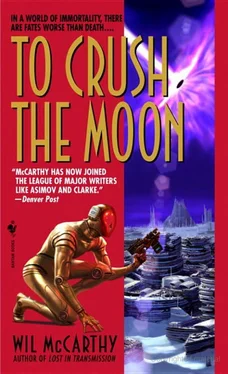“That’s probably wise,” he said to Sandra, and was satisfied with the surprise on her face. “Could I trouble you to send for them? We have no intention of breaking the letter or spirit of the law; we just want to present our enemies with a discouraging target.”
He sat up and looked at the kids assembled here, feeling for a moment that he could barely tell them apart. Here in the Queendom, modifying your mind or body required an alteration permit, and those were hard to get. As a result, these were some of the purest humans he could recall ever seeing.
It was too bad, in a way; Conrad was used to reading people’s character in their bodyforms. Troll? Centaur? Self-created jumble of anatomical talents and handicaps? Gorgeous human of near-mathematical perfection? Here they were all just kids, and to the extent he could read them at all, it was in their clothing and posture, their coloration and adornment, their facial expressions and manners of speech. And these things were easily changed, easily imitated. They didn’t require the bodily commitment that even, say, backward-bending knees would require.
More or less at random, he singled out one of the young men seated on the table. Like many of his fellows, the kid was shirtless—clad only in a pair of loose trousers and a thrice-looped wellgold necklace that flashed improbably in the room’s dim light. But his skin was chlorophyll green, lightly striped with darker tones, and Conrad liked that, taking it as a sign of personality.
“You,” he said, “what’s your name?”
“Raoul Handsome Green,” the kid answered.
“Handsome Green? Really?”
“Yes, sir. That’s the name my parents gave me.”
“Hmm. Good one. And when did they give it to you? How old are you?”
“Fifty-one, sir.”
“Do you have a specialty?”
“I do. I’m an art appreciator. Mostly Late Modern photography, although I admire the painting and sculpture of that period as well.”
“Hmm. I see. But you have other skills, right? Can you swim?”
“Yes.”
“Hold your breath?”
“Sure. For five minutes, maybe… I dunno, maybe six or seven minutes.”
“Really? Good,” Conrad said. “Very good. Why don’t you find some other swimmers and go print up some gill-diving gear? If we’re attacked, I’ll bet you four-to-one it comes from underneath.”
Raoul Handsome Green had no response to that.
“Is something wrong?” Conrad asked him.
At least Raoul’s face was expressive; his look combined the sullenness of a frown, the helplessness of a shrug, and the pointed amusement of a smirk. “I don’t know how to do those things, sir. Who do you think I am? Who do you think you are? We don’t become interstellar heroes just because you walk into a room.”
There were scattered sniggers at this from the other kids.
“You’re all staying here illegally,” Feck pointed out, fluttering his hand in annoyance. “What I would say is, who’s taking care of you if not yourself?”
“There are libraries here,” Conrad said, “right? You can pick up a block of wellstone and start asking questions. They still teach that in the schools, I assume? Research?”
Raoul shrugged. He wasn’t going to commit to an answer one way or the other.
“Anyone else?” Conrad tried.
It went on like that for a while, and Conrad eventually decided there were three separate problems here. First there was the obvious ignorance of these people. He found this personally disgusting and offensive—how could they look themselves in the mirror?—but in all fairness they simply had no practical experience. Doing anything . Nor did they need any in the eternal lives the Queendom had mapped out for them.
They were drowning in knowledge, but actually absorbing some, actually learning a skill, was something they did for amusement, not for money or survival. Their minds simply didn’t work that way. Of course, they’d all been born on Earth. If this conversation were taking place in a Lunar dome or asteroid warren, a planette or a spin-gee city in interplanetary space, he might have better luck. Presumably, ignorance could still be fatal in places like that, and would be discouraged.
Secondly, though, there was the problem of authority. Conrad and Xmary didn’t have any. They had surprised the crowd with their leaping and prancing, and yes, their status as returning star voyagers did carry a certain shock value. These kids had never met anyone like them; nobody had. They were clearly impressed. But it didn’t mean they would listen .
And there was a third problem which perhaps overshadowed the other two.
“Maybe the platform needs sinking,” one kid suggested at one point.
“I’m happy to risk my life,” said another. “And I don’t even have current backups.”
“What point are you trying to make with this self-defense crap?” asked a third, with genuine puzzlement.
And finally Conrad understood: these kids were deathists . Not Fatalists, perhaps, but not the sworn enemies of Fatalists, either. The philosophy of random mass murder did not strike them as obviously wrong. “There are too many people,” they’d said several times already. “There’s no purpose for any of this. Maybe there used to be, but we’ve never seen it.”
And it was a strangely difficult point to argue with; Conrad had groaned under the same burdens in his own youth. The answers had been different then, but the questions had not. And yet, life—any life—was full of challenges. Could it really be so different here?
“You may feel a greater urgency,” he suggested, “when death is actually imminent.”
Chapter Seven
in which certain difficulties are unmasked
“Your Majesty,” said Reportant Bernhart Bechs to the Queen of Sol, “this seems an awkward time for the king to be absent. Did you ask him to leave a copy behind?”
“No,” she said, not only to Bechs but to the other reportants here, clustered around her and her Palace Guards in a buzzing hemispherical swarm. Ordinarily her personal press cordon was set at eighty meters, with strict acoustic volume limits to discourage uninvited chitchat, but this was a press conference. Typically these would be handled by her press secretary or by some crisis-specific bureaucrat, but there was a lot going on this week, and she had dozens of copies working all across the solar system. Printing out one more was hardly a bother, and people were burning with curiosity anyway, so she had generously permitted the paparazzi to approach within ten meters of her physical person, and to ask—within the bounds of decorum!—anything they wished.
“The king,” she went on, “does not divide his attention when matters of science loom large. He is cloistered at his workshop on Maplesphere, and will remain there until his experiments are complete.”
“Does that mean weeks?” Bechs followed up. “Years?”
Bechs was, at the moment, a four-winged news camera only slightly larger than the queen’s pinkie nail. Strictly speaking this wasn’t necessary; they were in Chryse Downs Amphitheater on the northern lowlands of Mars, and Bechs’ physical self—one of him, anyway—was in a rental office just a few kilometers away. He could remote this bug; there was no need to be it, to run a shadow of his brain within it. Too, he was among the most respected reportants in the Queendom, and would be welcome at her side in his own human body. But old habits die hard, and Bechs was an old, old man. He was accustomed to interviewing Her Majesty in this way, and she, for her part, always recognized his signature wine-red cameras.
“Weeks, most likely,” the queen said. “If his problem is tractable he’ll solve it, and if it isn’t he’ll move on to something more immediate. It’s possible he’ll uncover new principles requiring much more detailed investigation, but if so he will delegate the problem—at least temporarily—to his technical staff. He’s aware that I have pressing tasks for him here, and he won’t lightly refuse.”
Читать дальше












